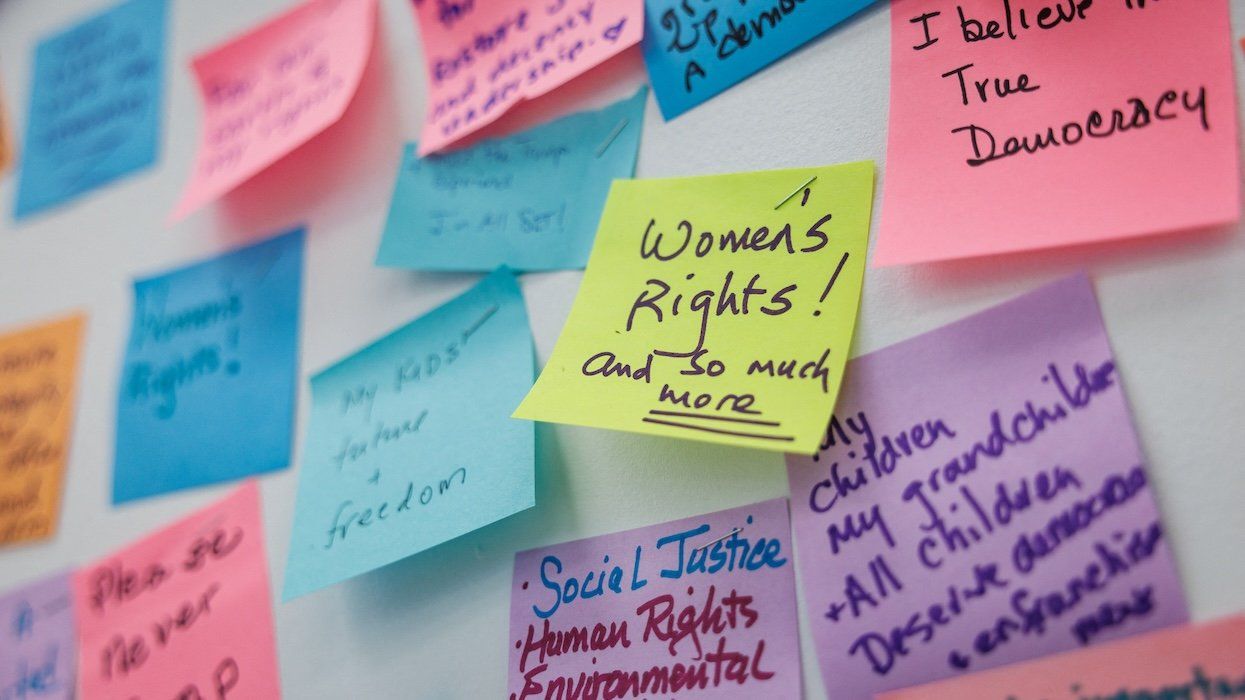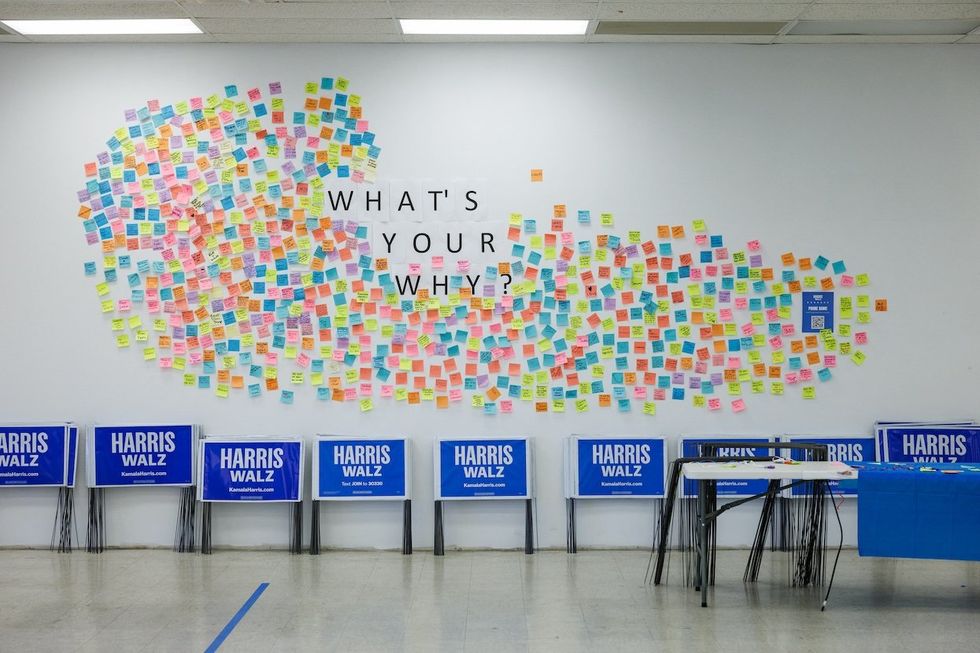As 2024’s presidential race intensifies, Washington, D.C., pollster extraordinaire, Democratic pollster Celinda Lake tells The Advocate what she is seeing and what she expects to happen on Tuesday when Vice President Kamala Harris and former President Donald Trump face off in the presidential election. Lake was the lead pollster for Joe Biden’s campaign in 2020 and is a lead pollster with the Democratic National Committee this year.
My first question for Lake was as bottom-line as you could get. “Is this a redo of the infamous Bobby Riggs versus Billie Jean King, man versus woman tennis match that happened in 1973?”
“Wow, that is a brilliant metaphor. I had not heard that before, but it’s so true. It is men versus women,” she began.
Harris is looking to run up the numbers with women to cover any losses with men. And Donald Trump is looking to run up the numbers with men to cover his losses with women.
More 2024 Election Coverage from The Advocate:
- Why The Advocate endorses Kamala Harris for president
- How pro-LGBTQ+ is Kamala Harris?
- Our 2024 LGBTQ+ voter guide
- Kamala Harris's 'first priority' as president
- Where does Donald Trump stand on LGBTQ+ rights?
- Kamala Harris: Our One-on-One With the Vice President
Most encouraging for Lake is the impact of reproductive rights on women’s voting patterns. “Recent polls indicate that suburban women — especially those who have leaned Republican in the past — are reconsidering their allegiances due to abortion,” she pointed out. “Many women view health care as a critical family issue and will likely reject proposals that threaten them.”
In terms of threatening, I told Lake that I’ve heard some crazy stories about women afraid to talk about their support for Harris out of fear and that some are leaving Post-It notes in women’s restrooms to encourage each other. I asked her if she’s heard about that. “I’ve seen them,” she replied. “There are silent women out there, which are hard to capture in polls.”
That arises partly from Trump’s efforts to maximize the male vote. “He had this theory when he was running against Biden in ‘20, and he’s kept it against Harris,” Lake said.
The gender gap is getting so big that it seems Trump is realizing he has to go after more women, she said. “There are a bunch of Republican women who vote for Trump. So he's gone after the blue-collar women but doing it so ineptly that he’s alienating a lot of them. What Harris has to do is keep the blue-collar women from voting the same way as their husbands.”
“Yes,” I replied. “I’ve heard stories about men telling canvassers that the wife will vote the way the husband is voting.” “Yes, that’s true,” she said. “I don’t think that story is an outlier.”
Lake noted that Harris is entering this election with a robust strategy that emphasizes personal outreach through canvassing — a stark contrast to the Trump campaign’s reliance on media networks like Fox News and base-driven messaging.
Trump’s approach is effective at energizing his loyal supporters, but it lacks the direct voter engagement Harris’s campaign is fostering, she said. “I don’t think [the Trump campaign] canvasses; that’s not the modus operandi,” Lake explained, “They communicate through conservative media and established networks rather than grassroots outreach.”
However, she cautioned that assessing Trump’s reach purely by canvassing metrics could overlook other influential channels. “We could be underestimating their contact if we measure it just by canvassing,” she said.
When it comes to voter enthusiasm, Lake is especially encouraged by the energy she sees among younger women, whose voter registration numbers are climbing rapidly, and by the strong support Harris holds with college-educated voters. “The issue of abortion is still a powerful motivator and will be in this election,” she said. “It’s galvanizing women across demographics.”
Lake believes this enthusiasm can help bridge some gaps for Harris. “What encourages me the most is the enthusiasm of young women and their registration rates,” she said, “Harris has the advantage with college-educated voters and women who feel the impact of restrictive abortion law.”
 Sticky notes where people wrote why they are supporting Vice President and Democratic presidential nominee Kamala Harris are left on a wall in the Harris/Walz Campaign Headquarters for Northampton County in Easton, Pennsylvania on November 1, 2024.Photo by SAMUEL CORUM/AFP via Getty Images
Sticky notes where people wrote why they are supporting Vice President and Democratic presidential nominee Kamala Harris are left on a wall in the Harris/Walz Campaign Headquarters for Northampton County in Easton, Pennsylvania on November 1, 2024.Photo by SAMUEL CORUM/AFP via Getty Images
Lake has areas of concern, though, within Harris's coalition, specifically among Latino men and white blue-collar voters, whom she sees as vulnerable to Trump’s appeal. “Again, I call it a ‘secret surge’ among Trump’s base, which could be difficult to detect in polling,” she said. ‘What concerns me is the vote among white blue-collar [voters]… and the effective use of wedge issues such as transgender rights, immigration, and crime, appealing to socially conservative voters.”
One key factor for Lake is the lingering perception among many swing voters that Republicans perform better on economic issues. “[Swing voters] still have that belief that Republicans are better generally on the economy and that [Trump] is a successful businessman,” she said. “To address this, Harris’s campaign has focused heavily on economic policies, hoping to counteract Trump’s advantage on this issue.”
I told Lake about my conversations with former GOP strategist Sarah Longwell and Lincoln Project cofounder Rick Wilson in which I learned that about 11 percent of Republican voters may be persuaded to cross the aisle or vote independent, a trend they have already observed in preliminary polls. “It’s going to be undermeasured,” Lake predicted.
For Black voters, Lake acknowledged that Black men have historically been a strong base for Harris, though some polls suggest minor defection. However, she believes this trend has been overstated and poorly understood by the media. “Black men are her second-best group,” she said.
Finally, Lake compared Harris’s current campaign to the 2020 Biden campaign she led, noting both similarities and new challenges. “Competing on the economy is similar,” she pointed out. “But the gender dynamics and abortion’s role in shaping female voter turnout make 2024 markedly different. I’m cautiously optimistic that Harris’s current momentum is a sign of strength, though momentum can shift quickly.”


 Sticky notes where people wrote why they are supporting Vice President and Democratic presidential nominee Kamala Harris are left on a wall in the Harris/Walz Campaign Headquarters for Northampton County in Easton, Pennsylvania on November 1, 2024.Photo by SAMUEL CORUM/AFP via Getty Images
Sticky notes where people wrote why they are supporting Vice President and Democratic presidential nominee Kamala Harris are left on a wall in the Harris/Walz Campaign Headquarters for Northampton County in Easton, Pennsylvania on November 1, 2024.Photo by SAMUEL CORUM/AFP via Getty Images


































































Charlie Kirk DID say stoning gay people was the 'perfect law' — and these other heinous quotes